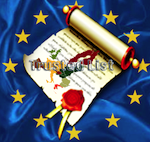
TLEdit desktop application has been created to make easier all the establishing, editing, maintaining and auditing activities related to Trusted List of supervised/accredited Certification Service Providers, in accordance with the technical specifications.
Hot news
TLEdit has been tested and commented by more than 30 experts and scheme operators from 17 member states or countries.
Key features
- Create Trusted List
- Edit Trusted List
- Maintain Trusted List
- Content audit of Trusted List
- XML validation of Trusted List
- Sign Trusted List
- Verify Trusted List
- Create Trusted List in “machine processable” form
- Create Trusted List in “human readable” form
- Generate self-signed certificate for signing the Trusted List "machine processable" and "human readable" forms
- Sign the "human readable form" with PAdES Enhanced signature
- Analyze and visualize Trusted Lists of other Member States, Trusted Lists issued by non EU countries or international organizations
- Cross-border signature verification and check against Trusted List
- Migrate the Trusted List version 4 to version 5 with a single click
Main advantages
- Easy to use
- You can keep it under control
- Enhanced input check
- On-the-fly analysis
- Includes a certified security module
- Cross-platform availability
- Corporate licensing
- Product update and user support service
- Consistent user interface
Conformance
- Electronic Signatures and Infrastructures (ESI); Trusted Lists
- laying down technical specifications and formats relating to trusted lists pursuant to Article 22(5) of Regulation (EU) No 910/2014 of the European Parliament and of the Council on electronic identification and trust services for electronic transactions in the internal market (2015/1505/EU)
- Electronic Signatures and Infrastructures (ESI); Trusted Lists
- amending Decision 2009/767/EC as regards the establishment, maintenance and publication of trusted lists of certification service providers supervised/accredited by Member States (2013/662/EU)
- Electronic Signatures and Infrastructures (ESI); Provision of harmonized Trust-service status information
- Setting out measures facilitating the use of procedures by electronic means through the "points of single contact" under Directive 2006/123/EC of the European Parliament and of the Council on services in the internal market (2009/767/EC)
- As regards the establishment, maintenance and publication of trusted lists of certification service providers supervised/accredited by Member States (2010/425/EU)
- TLS Plug-Tests 23-26/11/2009 F2F meeting report
Did you know?
Electronic signature
Electronic signature ensure the same level of legal security as handwritten signing. Slow and expensive paper-based approval procedures could be replaced with more rapid and cost-efficient electronic solutions.
Member States shall accept any advanced electronic signature based on a qualified certificate, with or without a secure-signature-creation device, for the completion of the procedures and formalities.
Member States shall accept any advanced electronic signature based on a qualified certificate, with or without a secure-signature-creation device, for the completion of the procedures and formalities.
Trusted List
Each Member State shall establish, maintain and publish in accordance with the technical specification a ‘trusted list’ containing the minimum information related to the certification service providers issuing qualified certificates to the public who are supervised/accredited by them.
Purpose of the Trusted List
The purpose of the Trusted List is to establish a common way in which information is provided by each Member State about the supervision/accreditation status of certification services from Certification Service Providers who are supervised/accredited by them for compliance with the relevant provisions of Directive 1999/93/EC. This includes the provision of historical information about the supervision/accreditation status of the supervised/accredited certification services.
Content of the Trusted List
Additional information on other supervised/accredited Certification Service Providers related to electronic signatures (providing Time Stamping Services and issuing Time Stamp Tokens, issuing non-qualified certificates) may be included in the Trusted List at a national level on a voluntary basis.
Forms of the Trusted List
Member States have to establish and publish their Trusted List in a “human readable” form and also a "machine processable" form which would allow automated information retrieval.
Trusted List in business
Trusted List can also be used in Business to Business (B2B) and Business to Consumers (B2C) transactions.
Cross-border electronic signature and Trusted List
Directive 1999/93/EC provides the qualified electronic signature with a specific legal value. However, in the absence of a trusted list the relying party cannot know if a signature is really qualified without investing unreasonable auditing resources. Under those circumstances, a relying party could well argue that it would not be required to recognise a qualified electronic signature.
A Trusted List would eliminate this risk. Certificate providers issuing qualified certificates listed on the Trusted List are by definition supervised, thus their qualified certificates are trustworthy, and thus the legal value of their signatures can no longer be reasonably contested by any relying party.
The elimination of this risk is the goal, effect and legal value of the Trusted Lists.
A Trusted List would eliminate this risk. Certificate providers issuing qualified certificates listed on the Trusted List are by definition supervised, thus their qualified certificates are trustworthy, and thus the legal value of their signatures can no longer be reasonably contested by any relying party.
The elimination of this risk is the goal, effect and legal value of the Trusted Lists.

